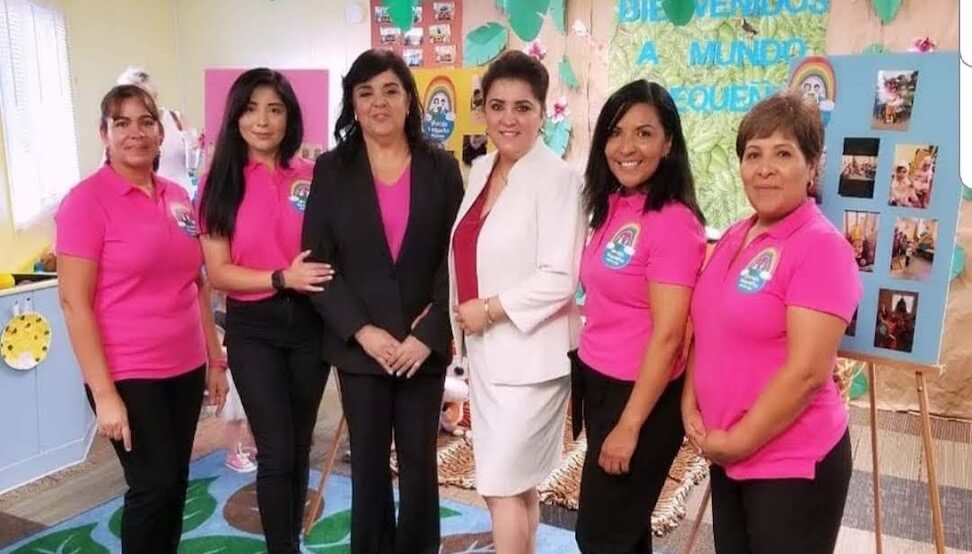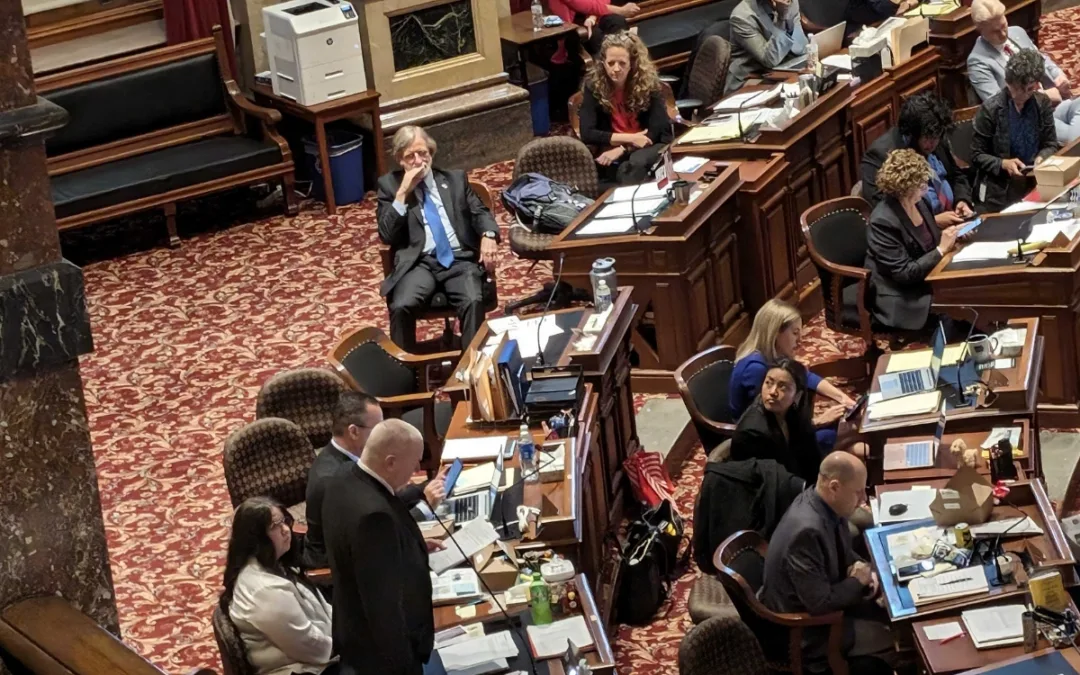
The staff at Mundo Pequeño
Sofia wakes up early to take her son to daycare before going to work. She is back in her office at an insurance company after more than three months of working from home due to the Covid-19.
As a single mom, it was a challenge trying to work while caring for and home schooling her seven-year-old son.
Reluctantly, she takes him to daycare since she has no other option, even when she feels nervous about any possible contact with a Covid-19 positive person.
Like Sofia, there are thousands of Iowans that feel uneasy about returning to a “normal” work life, but more than anything, they fear taking chances regarding their kids’ health or well-being.
[inline-ad id=”3″]
Grandparents have come to the rescue for their children by taking care of their little ones. They are not all unemployed — some are laid off and love the idea of spending time with their grandkids. Keep in mind that Latinos are more likely to disproportionately suffer from high blood pressure and diabetes, which makes them more vulnerable during the pandemic.
“I am excited to spend more time with my grandkids, yet I am scared to get sick with the virus if other family members are not taking the preventative measures seriously,” one grandparent I reached out to told me.
Childcare is an essential part of getting Iowa’s workforce back to their places of employment. As the owner of a Des Moines bilingual daycare, Mundo Pequeño, Lupita Castillo had to adapt to the challenges of taking care of many kids ranging from six weeks to five years old during this difficult time where the health of those kids and her employees are more important than ever.
Lupita is not only responsible for the health of so many precious lives, but she also knows that she must keep her daycare open to keep parents working during the pandemic.
“We are the base of the essential workers and others — without childcare, many individuals like nurses, doctors, police officers, and other workers would not be able to go to work”, said Ms. Castillo.
[inline-ad id=”3″]
Mundo Pequeño cares for kids whose parents do private pay and those who are paid by the state childcare assistance program. Lupita added that since the beginning of the pandemic she felt a lot of support from the state agency.
The program has been paying for their kids even if they do not attend for any specific reason. In addition, they started paying for some parents’ co pay, and she received a cash incentive to help during this time. This was made possible due to the bipartisan Coronavirus Aid, Relief, and Economic Security (CARES) Act which passed on March 27 of this year.
The CARES program includes resources specifically targeted for low income individuals and families affected by the public health and economic crises. This program includes a number of provisions of particular importance to children and families who work with them, including policymakers and other stakeholders in childcare and early education systems.
Her business, like many others, also had to change in terms of added safety against the virus. Lupita detailed some of the policy changes made to keep children and workers safe.
[inline-ad id=”4″]
For starters, no adults, other than the staff, are allowed inside the building. Everyone must do hand washing immediately after arriving in the building before starting any tasks. Temperatures are taken of all entering the building, staff, and children (no more than 100.4). In the event of someone reporting a temperature of 100.4 or higher, they cannot return to the daycare for seven days — children or staff. They are also not allowed to have more than nine kids and one teacher per class.
Castillo has done everything possible to educate her staff about the virus, insisting that staff not only has to practice these new measures at work but should also keep them in mind when they are not at work.
The Iowa Public Health Department reports that Latinos have been affected by the virus at higher rates than other demographics. Although Latinos represent only 6.2% of the general population, they account for 23.5% of positive cases.
Seventy percent of Castillo’s clients are Latinos.
“Even with those terrible statistics among our community and with the state having to close other daycares due to positive cases or exposure to the virus among their staff or clients, we haven’t had one single case in our daycare,” Castillo said.
[inline-ad id=”1″]
Many of the parents with children attending Castillo’s daycare are white collar workers and a small percentage work in the service industry.
One of her concerns about staying in business is that many of the companies where these parents work decided that their employees are going to work from home indefinitely. These decisions from corporations may lessen the need for her services.
“Before the pandemic, I used to have 55 kids. During these months, I have only had 20 kids. I also went from twelve teachers to eight,” said Castillo.
She also realizes that although she applied for government assistance, she is aware that help is not going to be a permanent or long-term solution.
On top of worrying about her business, the children she cares for and her staff, Castillo also has a difficult personal concern — her son has a pulmonary health issue. Because Lupita deals with the public in her role as a leader, she felt it was safer for her son to stay with his father, still in Des Moines, while things improve, and he can return home with his mother.
[inline-ad id=”5″]
Uncertainty begins to overwhelm parents as they return to work, their kids go back to school, virtual or other wise and childcare is a huge part of their plans.
True, things must go back to some level of normalcy if we are going to survive Covid-19. The question is, at what risk to the health of all the ones we love and the childcare providers who support workers in supporting themselves and the economy?
When it comes to these unprecedented conditions, family and workforce concerns, as taxpayers we deserve more than “good enough” leadership. We need excellent leadership. Let us hope for leaders like Lupita for all of us.
by Claudia Thrane
Posted 7/6/20
Iowa Starting Line is an independently-owned progressive news outlet devoted to providing unique, insightful coverage on Iowa news and politics. We need reader support to continue operating — please donate here. Follow us on Twitter and Facebook for more coverage.
Politics

AEAs cutting workers in wake of Republican legislation
Iowa legislators said a new bill cutting money for agencies that help students with disabilities wouldn't affect services. But area education...

He said what? 10 things to know about RFK Jr.
The Kennedy family has long been considered “Democratic royalty.” But Robert F. Kennedy, Jr.—son of Robert F. Kennedy, who was assassinated while...
Local News

No more Kum & Go? New owner Maverik of Utah retiring famous brand
Will Kum & Go have come and gone by next year? One new report claims that's the plan by the store's new owners. The Iowa-based convenience store...

Here’s a recap of the biggest headlines Iowa celebs made In 2023
For these famous Iowans, 2023 was a year of controversy, career highlights, and full-circle moments. Here’s how 2023 went for the following Iowans:...




